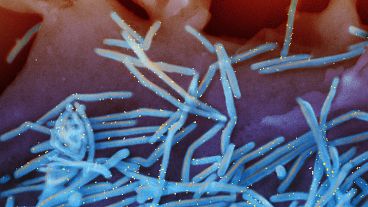The anti-acne drug isotretinoin is known to cause birth defects in infants exposed during pregnancy.
More than 170 pregnancies in Germany may have been at risk after being exposed to the anti-acne drug isotretinoin between the years 2004 and 2019, according to a new estimate.
Isotretinoin, which is better known under its former brand name Accutane among others, is a drug prescribed for severe acne that hasn’t been responsive to other treatments like antibiotics.
But the drug has a long list of side effects, among them the potential to cause birth defects, a risk called teratogenicity.
This is why the treatment is heavily monitored. Despite these guidelines, at least 178 pregnancies were likely exposed to isotretinoin, according to a new study published in PLOS Medicine.
“In the main analysis, we made very cautious assumptions to avoid overestimating the number of pregnancies exposed to isotretinoin,” Dr Ulrike Haug, the study’s corresponding author from the Leibniz Institute for Prevention Research and Epidemiology, told Euronews Next.
“Our sensitivity analysis showed that the number of exposed pregnancies could even be much higher, given that, there are some uncertainties in these estimates,” she said.
The researchers also found that the number of pregnancies at risk of exposure doubled per year during the study period. At least 45 per cent of the exposed pregnancies ended by induced abortion, the authors added.
The abortions are “not surprising” as women may have been concerned about malformations or had them detected on an ultrasound, according to Haug.
Pregnancy prevention programmes ‘insufficient’
Infants exposed to the drug during pregnancy face an estimated 20 to 35 per cent risk of congenital defects, such as craniofacial, cardiovascular, neurological, and thymic malformations.
Additionally, neurocognitive impairment has been observed in 30 to 60 per cent of children exposed to isotretinoin in utero, even when physical defects are not present.
The European Medicine Agency (EMA) specified that prescribers must ensure that “the patient has used at least one and preferably two methods of effective contraception including a barrier method for at least 1 month prior to starting treatment”.
This should be ongoing until one month after stopping the treatment, the EMA added.
Using information from a database covering roughly 20 per cent of the German population, the analysis included women between the ages of 13 to 49 who received isotretinoin orally.
The medication is used by almost 2 in 1,000 girls and women of childbearing age, according to the study.
“We report the frequency of isotretinoin use among women of childbearing age, and how it changed over time. We report on the number of pregnancies, and we also report on malformations,” Haug said, adding that the last part was only descriptive and that a causal link therefore cannot be drawn.
Researchers noticed that isotretinoin prescriptions rose by 63 per cent between 2004 and 2019 and that the 178 pregnancies were likely exposed to isotretinoin “during a time window most critical for foetal development,” according to the study.
“It has been reported that about half of pregnancies are unintended...There is a pregnancy prevention programme in place but obviously, this programme is not fully followed or fully effective,” Haug added.
Another study conducted in Denmark, Italy, Netherlands and Spain underlines a similar issue despite a change in the pregnancy prevention programmes (PPPs) in 2018.
“PPPs in Europe, as in the rest of the world seem to be insufficient, despite successive modifications,” according to the study.
Using its own database with anonymised patients’ data, the French governmental insurance system said that 170 pregnancies were exposed to isotretinoin in 2021. That number has not decreased in 10 years.
“I think it’s important to bring across the message to stop using the drug well before pregnancy, one month before pregnancy, as recommended,” Haug said, which means using contraceptive methods for this period as the active ingredient remains in the body for a while after discontinuation.



